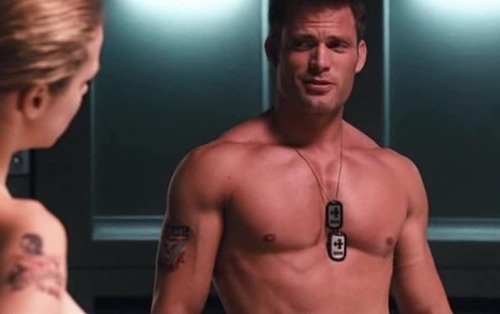To further add to the fiction, a platoon of young Marines, properly race and gender mixed, is sent on a war mission without a superior officer. Guess who assumes the role by force of character? One of the women. (And the moody, pouty, pretty, lovesick puppy-boy character needs to be shot.)
1997's Starship Troopers had a similar ultra PC Phallic-Female fantasy, but at least it had Casper Van Dien
and some savvy non-egalitarian politics.*
*The writer and director may be mushy Hollywood lefties, but the fact that so many people "missed" the satire on war suggests that a good story outran their intentions.
--


3 comments:
The more I think about military service being the qualifier for voting rights, the more I like it. I still hold on to my idea of requiring people to take a test on government, history, and economics before receiving a voting license. That way, we could abuse a loophole in the 14th Amendment right in front of the liberals' noses: "But it doesn't say anything about discriminating based on test scores!" Physically voting in each election would require an additional test to ascertain that voters understand current events and candidates' platforms. I suppose political power based on knowledge would be a form of Chinese-style legalism?
Both ideas have merit in my eyes. Military service voting eliminates the unengaged and the parasitic, and would almost certainly assure a majority-conservative electorate. Legalistic voting eliminates people who vote for somebody just because they were told to, and comprises people who have hopefully given the matter some thought.
-Sean
Requiring some sort of test sounds grand.
Down with DeMobCracy!
--Nathan
I honestly had no idea that the movie was supposed to be satirical. How in the world do people root for the insects? Their freaking _insects_, for Pete's sake! Looked at a certain way, the movie could be a meta satire on liberalism, naive fools who support creatures outside of their own phylum simply because they don't approve of their own species' decisions.
And Nathan, I don't recall any of the Founding Fathers calling the country a "democracy," it was always a "republic" to them. I recall in grade school, my father telling me to correct the teachers if they said our government was a democracy, and say "representative republic." When did that change in terminology occur? Hazarding a guess, I would say the 60s or 70s.
-Sean
Post a Comment